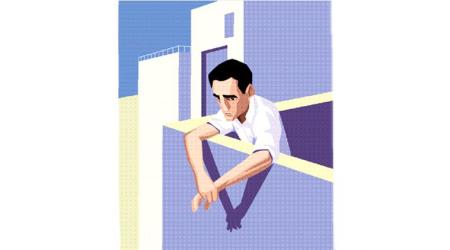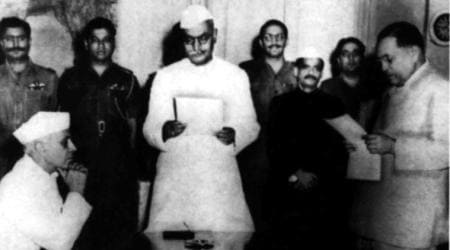 These conversations, if they happen, take us out of our comfort zones. (Illustration by C R Sasikumar)
These conversations, if they happen, take us out of our comfort zones. (Illustration by C R Sasikumar)
Here in Sydney, I have met a lot of Pakistanis. Contrary to what we have been made to believe, we get along well. Why? I think it is because far away from our mulks, the baggage of history seems a bit lighter. We don’t have to flaunt and feign patriotism by turning against the other. In faraway lands, our patriotism isn’t defined by hating the other as easily as it is in our respective countries.
It isn’t a way to counter racism — a “white vs brown” thing. At least, not yet in my case.
Is it because, mostly, we speak the same language? Maybe, yes. It could also be because we eat the same food. Does it matter when my Pakistani neighbours make kadi pakora they can share with us? I think it does. Sometimes, I think inherently we are the same.
So what defines this “sameness”? Is it a few big things coming together or too many trivial things that are difficult to keep count of? That we use the same cuss words and stock the same masalas in our kitchen cabinets? Or the bigger similarities: we have the same kind of media that fans the same kind of fires amongst us, provoked by politicians who play the same games, on both sides of our borders?
I was returning from Sydney Cricket Ground the other night. My Uber driver happened to be a young man from Karachi. After a few minutes, he opened up and we were talking like old friends. He hadn’t been to Karachi in eight years, since he arrived in Australia. These years, he says, were a revelation to him. The media back home had poisoned him against Indians, he said, but here he found us Indians to be just like them Pakistanis.
At the end of the ride, I asked him for a favour: to take something of me to Pakistan, when he visits Karachi at the end of this month. He was surprised. What could I be sending? And to whom? Who did I know there? I told him to take dher sara pyaar from this fellow Indian for his friends and family. That we need love between us and he could be that messenger. “Sure”, he said, “we are the same.”
But, maybe, we are not.
Well, for many of us, our mazhabs are different. But that’s not it. The problem, Indians have been told, is Pakistan itself. Here, though, if our communities try to mingle with each other, brotherhood does not seem too difficult. But if we get too close, the suspicions surface eventually. “That Indian fellow, he sent some chicken xacuti and claimed that it is halal meat. But is it really?” We trust each other and then we don’t.
Or when it comes to the wars, and Kashmir. Every time you hear that the other side has violated the ceasefire on LoC, try opening a website, any reputed news website, from the other side. You will see the inverse version. The two news reports won’t have a single thing in common (except, of course, guns firing and people dying).
On Kashmir, the unshakeable belief is that your own country and your own army is doing nothing wrong. The other side is always to blame. But we, mere citizens forced by circumstances in a foreign land, choose to ignore these issues and carry on.
If you make us talk about it, the layers of suspicion and mistrust slowly become evident. The propaganda of generations of politics, narrated by generations of editors, journalists and historians (for each nation writes its own version of history) to generation of uncles and chachas and nanas and dadas, over and over, has been cemented and fixed in our minds.
When a Pakistani colleague and I met over a cup of coffee and tried discussing politics, it was like putting the very basics of my strongly held beliefs to test. The stories they have heard on their side are just as one-sided as ours. Eventually, we realised that we are all reluctantly loitering in the grey areas here.
These conversations, if they happen, take us out of our comfort zones. My friend from Karachi went on: “Look, I understand. You call Muslims invaders. We invaded your land and ruled it for 400 years and when we left, we took away a piece of it and called it Pakistan — it is not fair but it happened. Par ab kya? It has been 70 years. Can’t we move on?”
I gulped, tried not to look startled and asked myself, how does one prepare for plainspeak like this? This is not Facebook or Twitter. The stakes are much higher than your typically timid and fickle social media timeline that changes loyalties with every hashtag. These are real conversations and we are real people — we work, attend meetings, eat lunch together and wish each other on our respective Independence days.
Meanwhile, we realise, yet again, that we aren’t the same.
The unlearning that we have to do, if we choose to do, is colossal. And with every passing generation, it becomes more difficult. It can happen when we talk to someone from the other side — something practically impossible in our respective countries. But, here, in a foreign land, we meet by circumstance and are bound by it. We talk with each other, first because we need to and then because we want to. And, as we talk, we can see ourselves being deconstructed. When that happens, yes, we are the same.
Then, of course, there is the matter of patriotism. If you are patriotic, you can’t be nice to anyone from the other side. It makes you a traitor. The other day, a woman from Pakistan asked Minister for External Affairs Sushma Swaraj for help on Twitter — a visa request to treat her two-year-old son, who needed an urgent bone marrow transplant. Few “proud” Indians, as they generally are, replying to her tweet, asked her why she did not go to China to seek assistance. Some Pakistanis shamed her for “begging” medical facilities from India. A two-year-old boy is fighting for life and Twitter warriors from India and Pakistan are defining patriotism. So yes, I guess, we are the same.
It does not matter if you are an Indian or a Pakistani who is reading this, because the question for us, aam janta, remains the same. How long will we let our patriotism be defined by hate?

